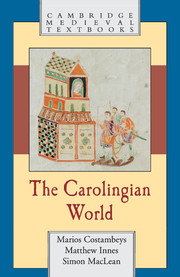Book contents
- Frontmatter
- Contents
- Illustrations
- Maps
- Acknowledgements
- Abbreviations
- The Carolingian family (simplified)
- The children and grandchildren of Charlemagne
- Map 1 Europe (relief)
- 1 Introduction
- 2 The creation of Carolingian kingship to 800
- 3 Belief and culture
- 4 Inventing the Carolingian empire: politics and government, 800–840
- 5 Villages and villagers, land and landowners
- 6 Elite society
- 7 Exchange and trade: the Carolingian economy
- 8 Sustaining the Carolingian empire: politics and government, 840–888
- 9 Epilogue
- Bibliography
- Index
- References
3 - Belief and culture
Published online by Cambridge University Press: 05 June 2014
- Frontmatter
- Contents
- Illustrations
- Maps
- Acknowledgements
- Abbreviations
- The Carolingian family (simplified)
- The children and grandchildren of Charlemagne
- Map 1 Europe (relief)
- 1 Introduction
- 2 The creation of Carolingian kingship to 800
- 3 Belief and culture
- 4 Inventing the Carolingian empire: politics and government, 800–840
- 5 Villages and villagers, land and landowners
- 6 Elite society
- 7 Exchange and trade: the Carolingian economy
- 8 Sustaining the Carolingian empire: politics and government, 840–888
- 9 Epilogue
- Bibliography
- Index
- References
Summary
In the first two chapters we have made regular references to the Christian character of the Frankish court, which acted as a powerful patron associated with the founding of monasteries, the patronage of holy men and intellectuals, and the production and standardisation of religious texts. Well before the end of the eighth century, where we left Charlemagne demanding comprehensive oaths of loyalty from his elite male subjects, and indeed before the anointing of 753–4, kingship itself was conceived as an office with religious responsibilities. Christianity was part of the very identity of elite Franks, who increasingly came to see themselves as a people chosen by God, and thus to define themselves in distinction to the non- and imperfectly Christian peoples that surrounded them. These ideologies played a part in the Franks’ justifications to each other and to themselves of their conquests. As victorious Carolingian armies withdrew they were often – as we have seen – replaced by missionaries, charged with winning the hearts and souls of the conquered, and with establishing their obedience to the Frankish Church (and, therefore, empire). Even if we find it to be outlandish or distasteful, we should not be surprised that Frankish kings thought themselves to have a moral responsibility to save the souls of those under their dominion, nor should we write this off as moral posturing designed to justify territorial expansion – after all, given the long decades of virtually unblemished military success, how could they not believe they were doing God's work? These themes represent central aspects of Carolingian politics and society which have been touched on earlier in this book, but which take centre stage in this chapter – here we hope to explain the mentalities and intellectual attitudes that informed the actions of those involved in the high politics of the previous chapter.
Yet placing Carolingian Christianity under the spotlight complicates matters more than one might expect. The closer we look at the concepts of religion, paganism, the Church, and Christianity itself, as they operated in early medieval Europe, the more they start to fall apart under our gaze. By placing Carolingian Christianity in a broad context, the chapter is therefore intended to shake the foundations of some commonly held modern assumptions about the early Middle Ages, as well as to offer some reorientation. The discussion is divided into three main sections: the problem of Christianisation; the problem of sin; and the role in society of Christian kingship and learning. But to understand the place of these phenomena in eighth- and ninth-century Europe, we must first define our terms of reference, and ask what we mean when we talk about paganism, Christianity and the Church. We can begin exploring these questions by visiting the Carolingian court itself.
- Type
- Chapter
- Information
- The Carolingian World , pp. 80 - 153Publisher: Cambridge University PressPrint publication year: 2011



